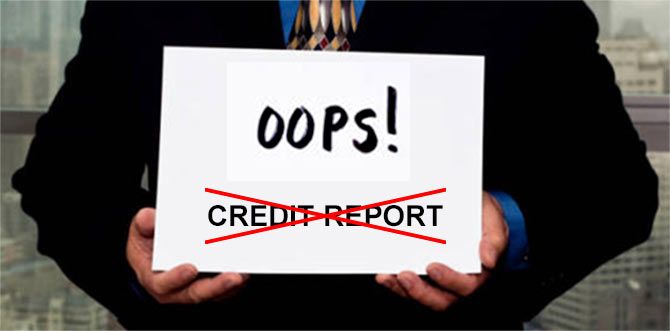While you can always correct them, the sooner you do it, the better it is for you, says Sanjay Kumar Singh.

With more and more places asking for it, any error in the report can prove costly.
With the rise in the use of credit scores for all kinds of transactions, from getting a loan to even screening of employees, it is becoming more and more important to constantly monitor and remove any discrepancy that may have crept into this critical number.
CIBIL, one of the four credit bureaus in the country, recently tied up with several e-commerce companies and employee-screening firms.
While the former will use credit scores to approve loans to customers to whom they sell goods through equated monthly instalments (EMIs), the latter will use it to filter out indebted employees (the rationale being that such employees are more likely to be worried about their loan problems rather than focus on the job).
The telecom sector uses credit reports to select customers for post-paid connections.
Even some schools have begun to ask for parents' credit scores.
Even as the use of credit scores and reports is becoming widespread, many credit reports contain errors.
A survey by Credit Sudhaar, an organisation which helps borrowers improve their scores, of 1,200 respondents across the country found that every third credit report had errors (though only 50 per cent had major ones).
Hence, do check your report from time to time.
"Inaccuracy in a credit report resulting from account-related errors can hurt your credit score. This can in turn hamper your chances of qualifying for credit through a credit card or loan," says Mohan Jayaraman, managing director, Experian Credit Bureau, India.
Credit bureaus prepare reports based on data collected from various lending institutions.
Sometimes the data provided to them contains errors.
Once the bureaus get the data, they use algorithms to collate each customer's data (from many institutions) using identifiers.
Sometimes, errors creep in during the matching process.
Errors also arise due to identity fraud.
Someone may have used fake documents and signatures to take a loan in another person's name.
The loan then gets tagged to the victim's credit history.
The process of getting an error in the credit report corrected is as follows:
- First, in case of an identity theft, report the matter to the authorities.
- Next, file a dispute form with all the four bureaus. In case of a player like CIBIL, this can be done online.
- Obtain your free credit score and report from their Web site.
- After logging into CIBIL's Web site, click on 'Raise a dispute'.
"The customer should select the account type and then make the necessary changes in the relevant sections of the report. The form can be submitted online for our review," says Hrushikesh Mehta, vice-president and head-consumer interactive, TransUnion CIBIL.
The bureaus look into the matter and then write to the bank.
"Due to regulatory requirements, correction of any information requires mandatory permission from the related credit institution," says Mehta.
Dispute resolution has to then happen between the bank and the bureau.
"Ultimately, the bank has to decide whether the loan is genuine or not," says Arun Ramamurthy, co-founder, Credit Sudhaar.
Jayaraman informs that according to the Credit Information Companies (Regulation) Act, the process of updating the credit information should be done within 30 days after the request has been made.
In reality, the process can at times be cumbersome and time consuming.
According to Ramamurthy, if the customer can produce documentary evidence to show that the loan is not his, the issue can be resolved faster.
For instance, suppose the date of birth in the loan documents is different from the customer's real date of birth. By submitting proof of his own date of birth, he can prove that the loan was not taken by him and get the matter resolved.
Photograph: Creative Commons






